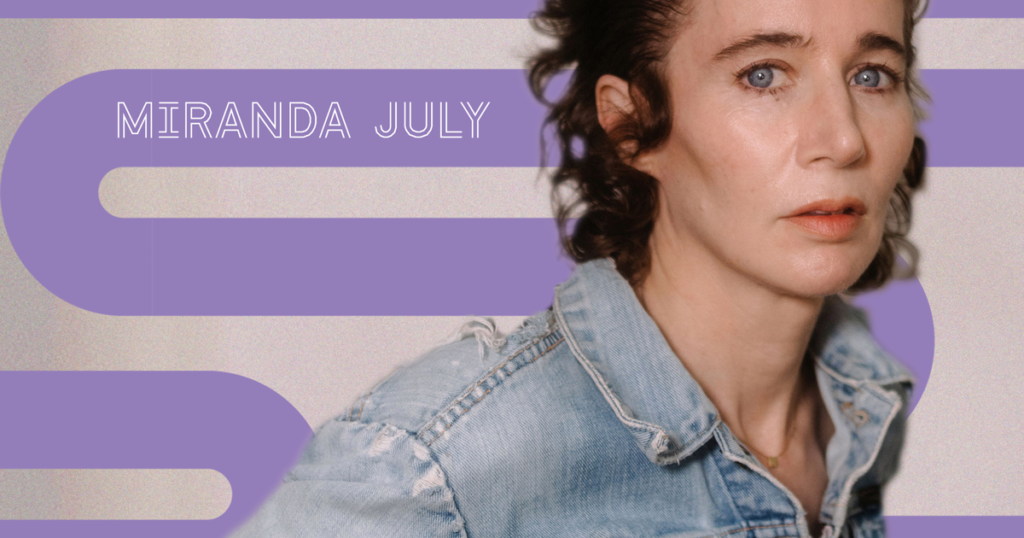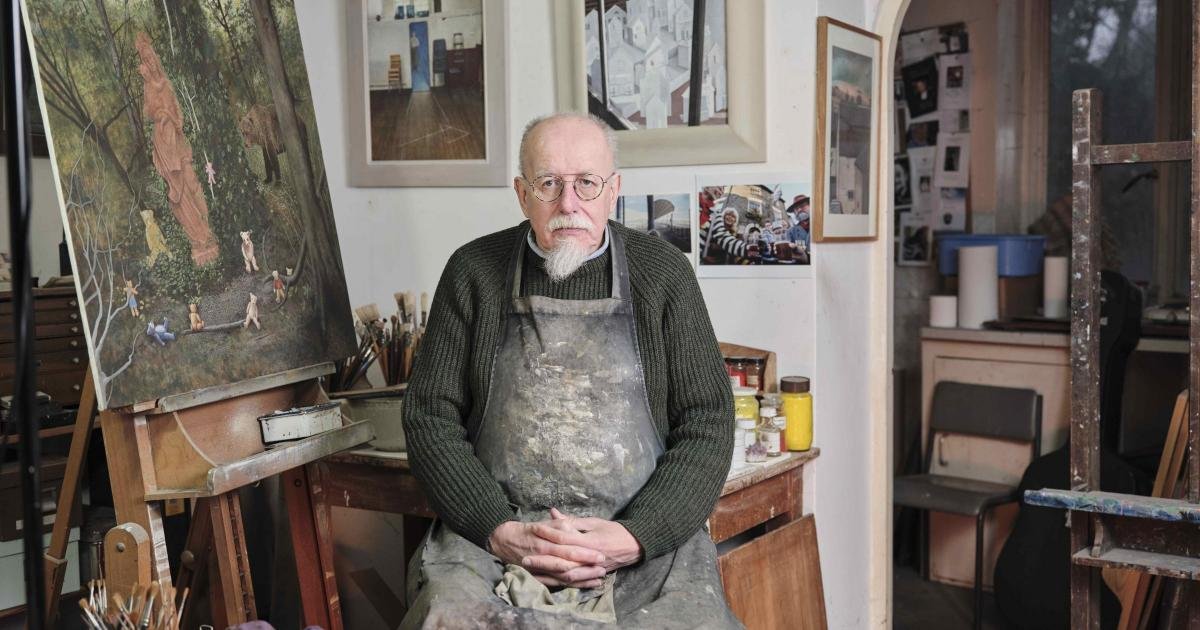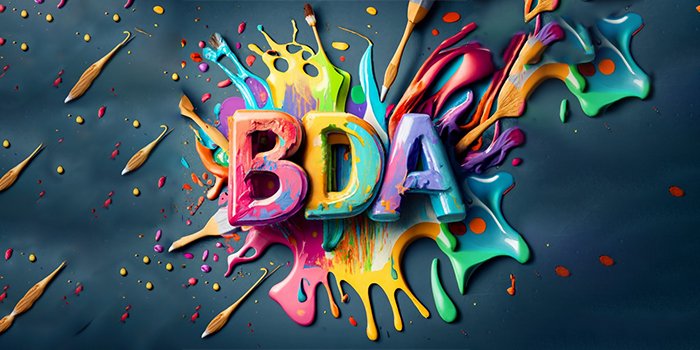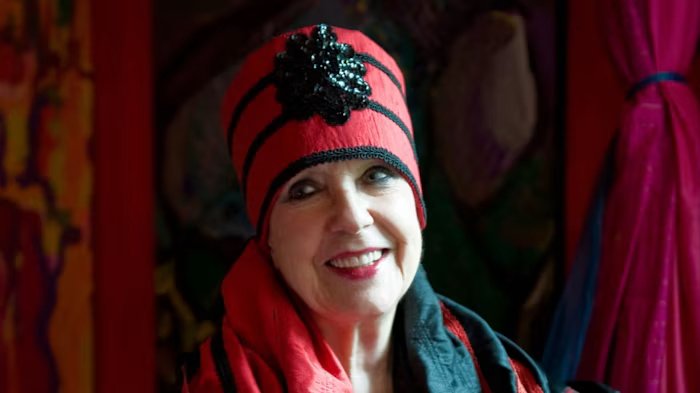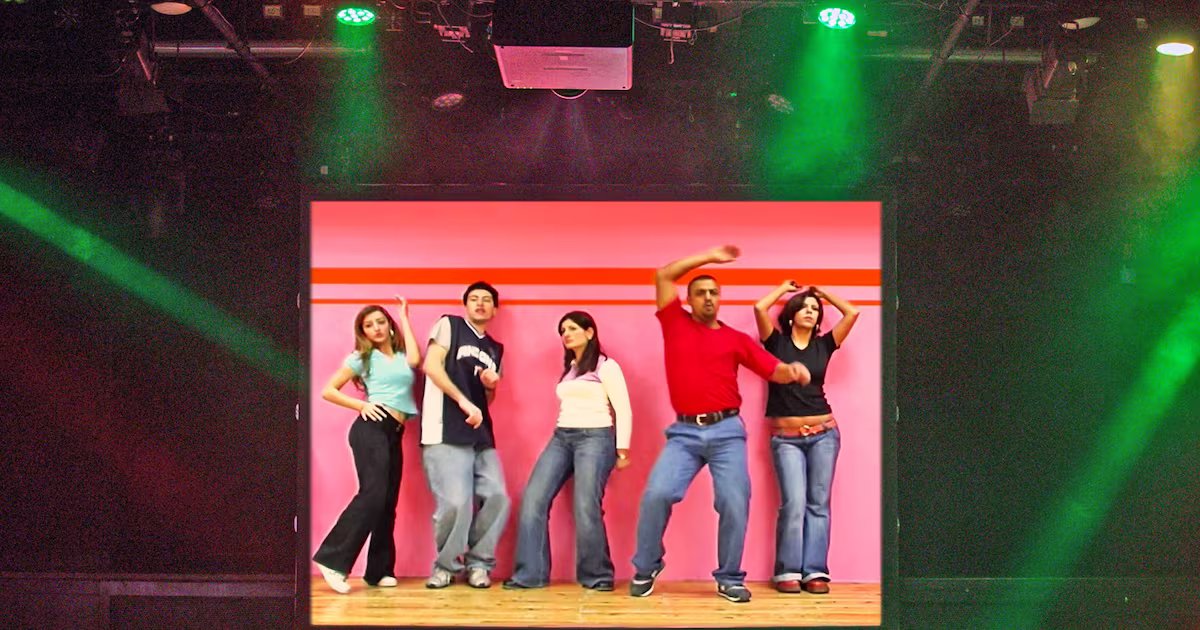The novelist on the difference between emotional honesty and autobiography

Miranda July, the writer, filmmaker, and artist, has written “the First Great Perimenopause Novel,” as The New York Times Magazine proclaimed last week. I came to a similar conclusion while reading the novel in question, All Fours, which chronicles one woman’s journey into menopause and out of a marriage. The unnamed protagonist is forty-five years old and, like July, is a semi-famous artist who lives in Los Angeles with a husband and one young child. Despite these seemingly autobiographical details, she is not a stand-in for the author. Rather, July transformed her own questions about having a family, making art, and aging into those of a character who could embody but also transcend the author’s own experience. Among its other virtues, All Fours cleverly subverts the (often male) road trip novel: here, the protagonist sets out for New York City but stalls out in a motel not far from her home, where she begins an emotional and physical affair with a younger man, a would-be dancer. She contemplates perimenopause and its conclusion, menopause, as an existential state in which her identity must once again be refashioned—even as obdurate bits of her former self resist any such refashioning.
The novel takes the character on a quest during which she seeks to understand not only what it is to be a mother and an artist, but what it is to occupy those roles while undergoing a physical change it still seems taboo to speak openly about. All Fours is a riveting account of the artist’s life, existential hunger, marriage and divorce, motherhood, and the complexities of living with (or through) all these identities and longings simultaneously. I read it in two sittings; it articulated ideas that I had been reflecting on and discussing with friends but have not yet seen widely expressed in literature. July and I corresponded on a Google doc this spring; the result has been lightly edited.
—Meghan O’Rourke, editor in chief
Meghan O’Rourke All Fours cast a spell on me and was hard to emerge from. I felt I was going through a mimetic version (as a reader) of what the narrator experiences: in the novel, she leaves her family to go on a cross-country road trip but doesn’t get very far. For reasons we’ll get into, she decides to return home, but the re-entry to her family life and marriage is destabilizing. Likewise, it was hard for me to leave the world of this book to return to my family! I devoured it over winter break, when I was cooped up with my family—my partner and our two young sons; the danger of reading it this way was immediately clear, since your book vividly presents a call to freedom from conventional forms of domesticity and marriage.
Miranda July Oh god, you read it inside the cauldron! I think that’s actually what I hoped for. I wrote it from the cauldron. I didn’t know what I was writing towards, but that cooped-up feeling was very strong, and it wasn’t a passing phase.
MO’R Where did the book begin? With the story, with the dilemma of the domesticized artist, with the predicament of being in the middle of one’s life?
MJ There was a question, in me, and in many of the conversations I was having with other women. We were wondering: Is this how it should feel? Is this sense of sacrifice on a soul level an indication of the profundity and goodness of the enterprise that is motherhood in the context of domestic life? Or, I began to wonder, is the problem too vague and insidious and we’re too tired and guilty, moment to moment, to question the whole premise? I mean of course it has been questioned, women’s lib and all that, but nonetheless everyone seemed pretty cozily tucked into the traditional concepts. From the outside, at least.
This sounds a lot more confident and breezy than I was when I was writing. I tried to grow the terrain as big and deep as possible before getting an idea for the story. In the past, when writing fiction or scripts I was always hoping for, praying for, and eventually getting a lightning bolt of an idea. But this time something in my gut said, The sooner you get an idea, the smaller the book will be. So I just kept putting notes into a file called “novel 2.” Just bits of conversations with other women, things I read that struck me. About aging and femininity, gender, desire, marriage. Some stuff about birth trauma. All the big themes of the book. But every time I felt a story coming on, I said, No. Too soon. And when I finally let myself concoct a story, it only got as far as the narrator coming home from her “road trip”—and the last scene: that was always what I was working towards.
I’m a person who has never drunk coffee; I love a downer and live in fear of accidentally taking something into my body that is an upper.
MO’R I imagine some reviewers will focus on the autobiographical parallels here. All Fours offers an intimate and powerful portrait of a couple tilting into divorce. You announced, in 2022, your separation from your husband, and in an Instagram post you described this book as “very close to the bone.”
MJ I had this new voice that I found from writing a short story called “The Metal Bowl.” This was a story I initially felt was very embarrassing, because it was that kind of fiction where you can easily imagine the narrator as a surrogate for the author. I had generally steered clear of this; I found more emotional room in women who were less like me, more character-y protagonists. Anyway, it was fun to write in this new way, but it also felt like a cheat, kind of sleazy, a little humiliating, even though it was just as fictional as anything else I’d written. (But how would I prove that?)
That anxiety fell away when the story was published. So many women wrote me; I heard from my peers, other writers and artists who were married, who were mothers. They wrote with veiled confessions about their own struggles. Well, I don’t think there’s much I want from life besides those conversations among women. They gave me the confidence to keep writing this way and keep imagining that these women were out there, nodding, knowing what I meant. These topics, these desires and fears, can be so easily dismissed. Everything, all day long, is working against a woman thinking of these issues as important. I imagine myself holding a grain of sand while being shaken around in the middle of the ocean for years and I can’t check to see if the grain of sand is still pressed between my two fingers because then it will be lost. The conversations with other women were how I knew it was still there and real—and that it wasn’t too silly, too minor, too indulgent, too icky to write about this time in a woman’s life.
MO’R In addition to writing fiction, of course, you are also a performer and artist and filmmaker who not only directs and writes but appears in your films as well. When you make art that has some basis in autobiography, is the process different for a novel versus for a film or performance? Or is that act of reaching into selfhood similar from form to form?
MJ Even though I’m always going for maximum emotional honesty, I don’t generally think of myself as making art that has some basis in autobiography. When writing my last movie, Kajillionaire, the premise of the story had nothing to do with my life; it was only after I finished a draft that I made any connection with my own childhood. Even this new book, which is so personal, would have just been a bunch of notes without the fictional story I created. I guess I am balking at the word autobiography because I get very frozen if I start with my life. I need invented characters that come alive and twists and turns that surprise me. This is my main joy in writing.
I guess this is a good way of answering your question: the fiction, in any medium, is the magical, spiritual part of the process for me. That kind of channeling where you’re like, Who is this? I’ve never even met anyone who talks like this, and yet I can’t stop writing in this voice. And if I’ve done my homework, which is to live deeply and write down my thoughts and feelings and conversations, then my unconscious or whatever it is can speak through this story and these characters.
My most recent work is a series of videos that are rather abstract; they feature me and strangers, no dialogue, very movement-based and surreal, with a heavy dose of technology. I guess it’s autobiographical in the sense that it’s my body, but like painting or sculpture, the ideas and emotions are coming through based on shapes and light and color and sound. In this world, things are allowed to stay submerged in mystery. What makes it art—that is, what makes it true—is the mystery, the fiction, the abstraction.
MO’R I think you make a really important point, one that I am often trying to articulate to myself, about the difference between the autobiographical and the personal in writing. I am rarely interested in autobiography for its own sake (though I often write memoir). What interests me is the way that one’s life can become the source material for a transforming question or invention—maybe that sense of transformation is why I like your book so much. I can sense its urgent source but also the artistry.
MJ It’s not an event but a feeling that forces me to write or make something. And that feeling is almost always unendurable pain and confusion. This was true of the first thing I ever made, The Lifers, it was true of All Fours, and it’s true of the thing I’m working on now, so help me God. Almost always these painful things are so private and tender I could never reveal them as they are; too many people would be hurt, myself included. And I’m not looking for more pain; I want relief and understanding and communion, the kind of comfort people find in religion.
I don’t know exactly how the pain turns into the finished work, or maybe I just can’t bear to say; it’s so laborious. I imagine scenes, I write them down on my phone or computer or notepad or the endpapers of whatever book I am reading, I write single sentences if I hear them, I force myself to do this even when I’m falling asleep or driving—I pull over—or talking to someone, I step away. If I have an idea when going to the bathroom at 2 a.m., I give up on sleep and pull out the computer and get it down. I tell myself, Well, tomorrow is wrecked, but all I needed to do tomorrow was write, so what does it matter? So much of All Fours was written this way, when my filters were thin. Again and again every day for years and then endless rewriting. I can’t tell you how different the book was only months before I finished. I cut at least a hundred pages. Maybe everyone does this, but I relate it to film editing, where you have a finite amount of material, so you say, What if we took the first half and put it here? What if what we thought of as the middle is actually the end?
MO’R I love that. I was just telling my writing students that ninety percent of the writing is in the editing, and that they need to think about film as their model for how much editing can happen when they’ve finished a draft.
MJ In film, we aren’t afraid to make radical changes in the edit; that’s how the movie is found. I guess writers do this even more. Until fairly late in the process of writing this book, every chapter was named after a different woman and featured a conversation with that woman. One chapter was called “Marion,” which was the name of the narrator. Amy Adams, the actress, was a fictional character in the book. I’m just trying to give you a sense of the process and how not straightforward it is. It’s always very, overly, complex until finally it becomes simple and what I think of as “round,” like a comic or cartoon.
MO’R There aren’t any other American novelists working in as many fields as you do. Can you describe what is behind your need to work in many genres?
MJ You’d think I’d have some thoughts about this. I do believe it’s a fair question, but just to give you a sense of it: it’s like being asked how it feels to be a woman writer.
MO’R Oh no! That might be one the world’s most annoying questions.
MJ It’s hard to get much perspective since I’ve always been this way and it does seem natural, actually more natural than what other people do by specializing. I think in my heart I feel this is natively how people are and that it’s only capitalism and hierarchies, meritocracy, that makes people need to define themselves so narrowly. In terms of gender, too, which I think dovetails with this, because it’s rare that a woman doesn’t have multiple jobs.
In my early twenties I came across a book by the artist and Bauhaus teacher László Moholy-Nagy, and I still have the bookmark in the spot that says, “Art is a community matter transcending the limitations of specialization,” which I took to mean we don’t have to specialize. So I guess I did need some outside approval on this.
Maybe the unusual thing is that I continue to do all the forms at a professional level rather than doing something “on the side,” for myself. Some of this is just my energy. I’m a person who has never drunk coffee; I love a downer and live in fear of accidentally taking something into my body that is an upper. And I calm myself, comfort myself, make sense of life, by making things. As I tried to get at earlier, that is often writing, but I could also make something with my hands or body in almost any medium and it would have this grounding and widening effect. Most of the things I make no one sees, in every medium (and they aren’t that spectacular). There’s a daily kind of generating of things that isn’t connected to an audience.
MO’R What I loved most about All Fours was the way it accurately described what it is to be a working artist and mother: not a person who is pulled to “have it all” but a person who has to make multiple shifts in her essential identity each day, shifts that are almost exquisitely painful to undergo. (I don’t know if you’ve watched Marvel’s Loki series, but in the final episodes Loki experiences a painful process called “time-slipping” in which he is pulled back and forth into different multiverses’ timelines, and his body, struggling to keep up with the physical change, distortedly degrades into strings before snapping back into place: that’s what trying to make myself available to both art and children feels like to me.) One of the gifts of your book is that it describes this identity-slipping (and the glitches it brings) in a way I’ve never seen done. Were there things you actively wanted to portray about motherhood—and/or stereotypical framings you wanted to avoid?
MJ I’m glad you felt this way. Compared to some of the territories I was trying to write about, motherhood/artisthood felt fairly well traveled, which is to say I had already read and loved what other people had written about this (Rachel Cusk and Maggie Nelson come to mind). But then you figure it’s never enough, and you might as well throw your hat in the ring. The parts I feel best about have a consciousness that I’ll describe as “masculine,” sometimes even literally, like when the narrator compares herself to Buzz Aldrin returning from the moon.
The work we’re doing when we’re away from our kids is large-scale and important and consuming, but as a mother you are a good person if you understand that nothing
is more important than your mothering. When Buzz Aldrin returns from the moon, they want a shot of him with his family, they might even dwell on these family images, because it goes without saying that his identity is really this monumental achievement that literally has nothing, zero, to do with his family. So it’s kind of thrilling, almost perverse in a sexy way, to see him being a dad.
Because I had the sense of writing for, almost with, other women, I could have my narrator move around with this Buzz Aldrin kind of consciousness inside her, a profound belief in her life’s work (which is stated right up front) as if there was no conflict or tension around this as a woman, a mother, in a patriarchy. Then, from this position (her interior position), all the awkwardness of the reality of life as a woman, all these transitions and identity shifts, would be at an accurate scale, which is to say a sort of constant crisis.
Subscribe
New perspectives, enduring writing. Join a conversation 200 years in the making. Subscribe to our print journal and receive four beautiful issues per year.
I know we are all feeling very bad about this constant crisis, like what the fuck is wrong with us that we can’t get this figured out or not feel bad about it. But remember the tiny grain of sand. Remember when Jordi and the narrator talk about what would it look to stop performing sameness, to live according to the reality of our biology (and the emotional, mythic, spiritual world that comes with it)? I’m probably adding stuff because there’s only so smart these characters can be before it turns into a theory book (and lord knows I’m not a theorist). But what I was trying to show was the lived experience: it feels bad for a reason. We’re driving against the flow of traffic in this life, against our own flow, and this is what that feels like. And the moments that don’t feel like that are powerful and psychedelic, but we aren’t sure if we should trust them, if they are sturdy enough. My narrator ultimately does.
MO’R I was struck that work is a form of romance for this narrator. At one point, you write, “Working was a romance with life and like all romances always seemed on the verge of ending, was always out of my control.” Writing a book is a long and slow process of being alone at one’s desk. What drives you to do it and what is hardest about it for you?
MJ The other forms aren’t easier for me. Maybe they look more fun or more glamorous, but I have a lot more control in a novel. When I’m making a movie, I tell myself that it’s good not to have control because life itself is not under our control, is full of happy and unhappy accidents like the kind you discover in the editing room. In any case, writing is most native to me, maybe because I am the child of two writers who grew up in their publishing company. I feel at my best, my most capable, both craft-wise and in terms of the internal process—the devotion and discipline.
With this book, I was driven by own deep confusion and distress about the way forward from this (hopefully) midpoint of my life. All I could think to do was to put more weight on things that felt good, even if they seemed flaky or insubstantial. Like dance. Like talking to other women. Maybe these things couldn’t be the bedrock of my life like my home with my husband was, but I felt honest and free doing these things, so maybe I had to follow them, like clues, to find a new bedrock. There were days with their many responsibilities and, often, enduring depression and anxiety. But anytime there was a flash of something mysterious or ecstatic, the book could hold that. The book became my main sense of myself, a mythology that was shaping me as I shaped it. And I know I’ve said this many times already, but I was not alone. I never had to look very far for reassurance. A mom at playdate. A stranger’s DM. The whisper network was strong on these subjects.
MO’R I have found it dissatisfying to have my poetry read too autobiographically—because even if sometimes a poem has an autobiographical origin, more often than not it doesn’t, or the personal interest is transformed into something externalized and strange and new by something alchemical that happens in the writing, where the personal problem becomes some other kind of problem, an art problem. Do you feel this novel is a work of autofiction, or do these kinds of labels simply not matter to you in the intimate, formal work of making a book?
MJ I think I’m more interested in characters and plot than most people in the autofiction category. Twists and turns and big reveals. . . . that novel-y stuff that I enjoy when it’s done well. All my books and all my movies, with the exception of a nonfiction book called It Chooses You, are big, constructed narratives. The thing I did differently in All Fours
(and first with “The Metal Bowl”) is something I probably learned from my art and performance work, which is to borrow a little bit of real life and mix it in to change the stakes and material of the fiction. To make it harder to dismiss.
For example, my performance New Society was meticulously scripted, the same every night, but there were these holes for the audience, so depending on who was there it would be a little different each night—both in a Mad Libs sense and in the soul of it. These real people had skin in the game, and that changed everything, most of all the stakes and everyone’s attention level. There is a scene, part of a story, in which eight couples from the audience go on stage and mingle silently, but eventually find their partner and begin slowly kissing them. We don’t know who came with whom so it seems kind of shocking at first, as if they are kissing a stranger, and then it’s very beautiful, you see a bit of who they are when they’re alone. But I’m talking as they kiss, telling a totally made-up story that colors what we’re seeing, makes it extra heartbreaking. And “Bird on a Wire” is playing. So I’ve taken something we know is real (these couples) and had my way with it, made it tell the story I want to tell. I think I did this with All Fours too, borrowed things from my life (my job, my body, my city, my friend’s sculptures) and then told the story I wanted to tell. I didn’t need very much real life; it’s strong, like a tiny drop of red food coloring.
MO’R Your book is coming out along with a crop of other books that critics are already referring to as “divorce books,” including Leslie Jamison’s Splinters and Sarah Manguso’s Liars. Do you think there is something in the water, so to speak? Or are we just seeing a crop of female writers in the post-confessional generation reach the age in which they would write about divorce?
MJ I’m sure it’s many things, but I also think a proud pussy grabber being elected president impacted women on a psychic level, and those married to cis men felt extra alone and misunderstood in their homes. #MeToo was also experienced very differently by women and their male partners. And then, with this scene set, the pandemic came and suddenly there was no escaping the men. Which in extreme cases was dangerous. And in the luckiest of cases, simply forced issues to the surface and made them intellectually available, whereas in other eras they could ferment for a lifetime with very little consciousness.
MO’R The book displaces the claustrophobia of a marriage with the claustrophobia of a tiny hotel room. A hotel room is also a space that offers anonymity and geographic freedom—even as it is a space we have very little control over. In your narrator’s stay, she finds a way to get control over the space: she decides, almost gleefully, to spend a wild sum of money to redecorate the room.
MJ Decorating a home was something I hadn’t done myself as a real adult, and I really wanted to. Seems like a pretty easy dream to fulfill, but there were a lot of things stopping me, including having not much money or time. So I thought I would just let myself do it in the book. I would follow pleasure and beauty and see where it led me.
Also, I had recently read a Helen DeWitt short story that goes into a surprising level of detail about dressmaking. I just searched my file and found my note on that: “Helen DeWitt. That it’s interesting to follow someone making something if it’s for an exciting reason — like making those suits for the show, for the money. Making the hotel room beautiful.” I decided it was interesting enough.
Gradually, over years, I came to realize that the narrator’s desire to decorate was the tip of a very large iceberg. What makes a home? Can you make it up? Will it be “real”? Is real just a construction held together by fear? And if a home is a place for love and intimacy and honesty, then maybe it is not one thing, different for everyone, always changing—and political. Since there is no pure form of love and intimacy and honesty, they are always made of long histories of unsafety. Everyone in a home feels a different kind of unsafety, depending on who they are. Cozy! Ha. But coziness is the goal. A safe, relaxed feeling that is possible for the narrator in the motel room and eventually (spoiler alert) everywhere else too.
MO’R A key preoccupation of the book is what it is like to be in the middle of one’s life—to be approaching menopause.
MJ As humiliating as it was to marry my name to the word menopause,
the writer in me could not believe my luck at stumbling into such an important, interesting topic that was so untouched. (Not to discount the important books that came before; I read them all. Darcey Steinke’s Flash Count Diary
was probably the most relatable.)
We feel we should be much farther along as women. We can’t figure out how to have a woman president.
But just to make my grandiosity clear: I would look each week in The New Yorker
to see if I’d been scooped by one of my peers. I remember Sarah Manguso wrote a piece for the magazine called “Where Are All the Books About Menopause?” This came out when I was just starting All Fours! It was largely about Steinke’s book but also a bit about her own experience of seeing an old woman looking back at her in the mirror. We all have days like this, and I’m sure this old woman wasn’t the end of the story for her. (We’ll find out in Liars.) But I kind of balked at her description of this time of life. It didn’t match up with what I was feeling.
How could any one woman’s account of aging and menopause be enough of a mirror for us all? The specific physical experience varies so widely, so I knew that my fiction had to be less about symptoms (my narrator never has a hot flash) and more about an internal state and how the real world shapes and might be shaped by us at this age. And it would have to contain the disagreeing and contradictory takes of many women as opposed to a single lone truth.
Also, I wanted my narrator not to be as wise and stoic as we all pretend to be about these subjects. The unspoken consensus, among women who want to be taken seriously for their work, is that it’s safest to not admit much vanity, to work hard and to be smart and hope you appear honorable. But how can we move through and past the construction of femininity if we won’t get our hands dirty and admit to being caught within it? That’s the first impossible step. Hard for me (still), but my fictional narrator could get away with it and then keep on walking and get somewhere really new.
The only other option is safety in numbers. Like if all the women, all at once, said, This isn’t working for us, then maybe we would be safe enough within this patriarchy to widen the space for women over forty-five. This image was with me from the start; I wrote that vision of the women gathering in the field like horses very early on. And I tried to write a book that would call together, would invite in, would not shame anyone.
One of my readers (my best reader) admitted that she didn’t really worry about aging and didn’t experience much vanity around it. It was good she said this. It reminded me that my mom is like this too, which is why I was finding it hard to relate to my vanity. I was so ashamed to not be like my mom and my smart friend. But that shame: that’s mine to work with. My gold. I’m trying to paint a picture here of how the other women came into the story (and how they weren’t all in agreement) and why the subject felt so important. We feel we should be much farther along as women. We can’t figure out how to have a woman president. We find it very hard to come together on issues, etc. I wish, increasingly, that I was more politically savvy. But I felt that I could take everything I do have—my ability to be vulnerable, my willingness to play the fool, my craft, my fame/cool persona that I never really related to—I could use all these things to make the book and like a rock, throw it with all my might towards the ageism/misogyny cocktail that we need to be done with now.
This is the kind of grandiose thinking that keeps you in the desk chair for four years. I remember the pandemic ending (“ending”) and everyone being full of plans and me thinking: Do not get up, Miranda. This party is not for you. Stay seated.
And the kind of miraculous thing was that things began to change while I was writing the book. Hormone replacement therapy (HRT) is now covered in the U.K., and there’s a big healthcare push around menopause there. I read about that from my chair. I read “Women Have Been Misled About Menopause” (Susan Dominus’s cover story for the New York Times Magazine) and the thousands of comments on that article, which were all some version of: Finally. As I was doing copy-edits various women celebrities started selling products for women in menopause. There’s something new in this territory nearly every week now, and I hope there are operas, songs, plays and many, many novels on the way. It will take all that.

